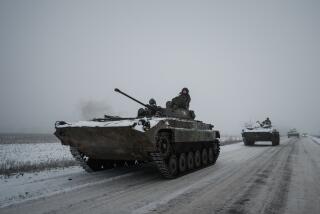White House Hails Yeltsin, Says It Expects Long Tenure : Diplomacy: Russia’s leader is called ‘forceful.’ But other officials have said he may be a transitional figure.
- Share via
WASHINGTON — Amid new warnings that Boris N. Yeltsin’s hold on power may be growing more tenuous, the White House on Thursday issued a new statement of support for the Russian president, saying it expects him “to be in office for some time.”
Officials also announced expanded medical shipments to the Central Asian republics.
White House Press Secretary Marlin Fitzwater praised Yeltsin as “a very forceful leader, a man of courage.” He said Yeltsin is “the man that we’re counting on to be there to provide guidance in Russia as well as that part of the world for a long time to come.”
His statement, made at a daily news briefing, contrasted with statements from some Bush Administration officials who have said privately recently that Yeltsin could turn out to be a transitional figure who may not be in power by year’s end. There has been similar speculation in Europe.
Yeltsin has said often in recent days that without massive Western aid, democracy is threatened in the republics that once made up the Soviet Union.
Uncertainty has also been heightened by recurrent suggestions emanating from Russia that another attempted coup could be brewing. Such a danger remains and may be “even bigger” than the failed coup against Soviet President Mikhail S. Gorbachev last August, former Soviet Foreign Minister Eduard A. Shevardnadze said in a Moscow television interview this week.
In what one Administration official later described as a concerted effort to shore up Yeltsin and counter the conflicting statements, Fitzwater said, “We expect him to be in office for some time, and we are placing great store in working with him.”
That statement reflects the dilemma facing U.S. policy-makers, in which what they want, and what may be happening, appear to be in conflict. U.S. officials see no palatable alternative to Yeltsin as Russia’s president and view him as the most likely figure to lead his nation toward greater democracy and economic stability.
But the reality of political life in Russia suggests to these officials that he may not be able to survive pressures building in response to his move to free-market economic policies.
Even as large numbers of supporters rallied to his defense last weekend in Moscow, another large demonstration, reflecting conservatives’ dissatisfaction, called for his removal.
The new aid announced Thursday, although far short of the amount that Yeltsin says is needed, will mean 10 more flights of medicine and bandages. This will raise the planned total of U.S. air missions to 64. The U.S. contribution is part of a loosely coordinated Western campaign to carry medical supplies and food to the struggling republics.
“Special emphasis will be placed on high-impact deliveries to Central Asian states where the demand for emergency medical relief is especially high,” Fitzwater said of the new flights.
He said the supplies were found Monday by the Defense Department among excess medicines and other materials that belong to the U.S. Army in Germany. Earlier flights have carried similar material, along with packaged food--known as “meals ready to eat” or MREs--that had been stockpiled last year for U.S. troops in the Persian Gulf War.
In the first four days of the airlift, Fitzwater said, 27 U.S. flights have carried supplies to 13 of 20 cities on the aid list. He said the decision to boost the number of flights was based on finding more supplies, rather than a determination of increased need, which is already considered vast.
“It’s not a case where you’re going to come up a week from Tuesday and say, ‘That’s enough,’ ” he said. “I mean, they’ll be able to absorb everything that they can get.”
THE TIMES POLL
Doubts Raised on U.S. Aid Recession-minded Americans doubt that unrest in Russia and the other former Soviet republics is a major threat to the United States and most worry that U.S. aid to those countries will be excessive rather than inadequate, according to a Times nationwide poll.
What concerns you most: that the U.S. will give too much financial aid to the former Soviet republics when we badly need it at home, or that the U.S. will give too little economic aid and risk the political and financial breakdown of those countries?: Too much aid: 73% Too Little: 15% Neither: 2% Equally: 4% Don’t know: 6%
How much of a threat to the U.S. is the instability in Russia and other former Soviet republics?: Minor: 24% Fairly small: 38% Fairly large: 24% Don’t know: 4%
Major: 10%
How much do you think the U.S. can trust Russian Federation President Boris Yeltsin?: Not much: 22% Only some: 45% Good amount: 29% Don’t know: 4%
Source: Los Angeles Times Poll of 1,776 adults nationwide, Jan. 31 through Feb. 3, 1992.
More to Read
Sign up for Essential California
The most important California stories and recommendations in your inbox every morning.
You may occasionally receive promotional content from the Los Angeles Times.













